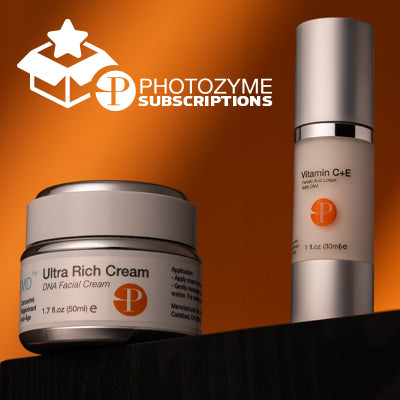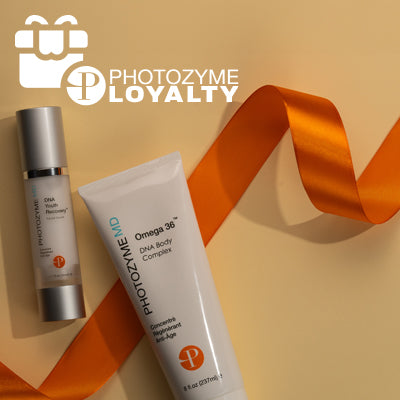
Key Takeaways:
- Retinol: A Powerful Acne Treatment: Retinol effectively treats acne by promoting cell turnover, regulating oil production, and reducing inflammation, making it an essential component of an acne-fighting skincare regimen.
- Gradual Use For Maximum Benefits: Starting with a low concentration and gradually increasing retinol helps minimize irritation while harnessing its acne-clearing benefits.
- Boost Results With Photozyme's Innovations: Combining retinol with innovative products like Photozyme enhances skincare outcomes, offering solutions for clearer, more youthful skin.
At Photozyme LLC, based in Carlsbad, CA, we are dedicated to pushing the boundaries of skincare science. We have integrated retinol into our product lines for its anti-aging benefits and effectiveness in combating acne. With Photozyme's emphasis on innovative and proprietary ingredients, such as those found in their GFS Night Serum and other products, the integration of retinol supports its mission to offer unique, efficacious skincare solutions.
For many, acne is a relentless issue that can significantly impact self-esteem and skin health. Amidst various treatments and remedies, one question frequently arises: Does retinol help with acne? The answer, backed by scientific research and dermatological endorsements, is a resounding yes.
In this article, we will explore how retinol can transform acne-prone skin and highlight how Photozyme’s innovative solutions, combined with retinol, can help you achieve radiant, blemish-free skin.
Retinol: The Mechanism Of Clearing Your Skin
When exploring the efficacy of skincare ingredients, particularly in combating acne, it's crucial to understand the underlying mechanisms at play. One question often on the minds of those affected by acne is: does retinol help with acne? The answer lies in the multifaceted approach retinol takes to clear your skin.
Retinol, a derivative of vitamin A, is celebrated for its potent anti-aging properties, but its benefits extend far beyond reducing the appearance of fine lines and wrinkles. Retinol promotes cell turnover and regeneration at its core, which is critical in acne treatment for several reasons.
1. Unclogging Pores: Preventing Acne Formation
Retinol helps unclog pores by accelerating the rate at which skin cells renew. Acne is caused by the build-up of dead skin cells and sebum (oil) in the hair follicles at its most basic level. By ensuring that dead skin cells are shed more efficiently, retinol prevents them from becoming trapped inside pores, thereby reducing the formation of comedones, which can evolve into the more familiar forms of acne, such as pimples, blackheads, and whiteheads.
2. Fading Post-Acne Marks With Retinol
Retinol's role in skin cell renewal assists in reducing post-inflammatory hyperpigmentation (PIH), a form of discoloration that appears on the skin's surface following acne breakouts. By speeding up cell turnover, retinol aids in the faster fading of these dark spots, contributing to a more even skin tone.
3. Regulating Oil Production To Prevent Breakouts
Retinol has been noted for its ability to regulate oil production. By keeping oil production in check, retinol helps create an environment less conducive to the development of acne. This regulatory ability and its exfoliating properties position retinol as a key player in the fight against acne.
4. Anti-Inflammatory Feature
Retinol's anti-inflammatory properties cannot be overlooked. Inflammation is a significant factor in the formation and severity of acne. By diminishing inflammation, retinol helps reduce current acne and prevents future breakouts.
How To Apply Retinol For Best Acne-Fighting Results
Applying retinol correctly and integrating it thoughtfully into your skincare routine is crucial to harness its acne-fighting power most effectively.
Here's a step-by-step guide to ensure you get the best results:
Start Slowly
If you're new to retinol, begin with a lower concentration and use it sparingly to see how your skin reacts. Gradually increase frequency and strength as your skin adjusts.
Cleanse First
Prioritize a gentle, pH-balanced cleanser to remove impurities and excess oil without stripping your skin. The Probiotic P291 Cleanser from Photozyme is an excellent option, preparing your skin to absorb the retinol treatment better.
Apply To Dry Skin
After cleansing, wait until your skin is completely dry. Applying retinol to damp skin can increase irritation because it absorbs more rapidly.
Use A Pea-Sized Amount
A little goes a long way with retinol. Use a pea-sized amount for your entire face, applying it evenly with your fingertips in upward motions.
Moisturize
Following up with a nourishing moisturizer is key. It can help to mitigate any potential irritation or dryness from the retinol. Photozyme’s Ultra Rich Cream is designed to hydrate and soothe, making it a perfect companion to retinol treatments.
Gradually Increase Frequency
Start by applying retinol 2-3 times weekly and observe how your skin responds. If well tolerated, you can increase your nightly use.
Sun Protection Is A Must
Retinol can make your skin more photosensitive. Always apply a broad-spectrum sunscreen in the morning, especially when using retinol products at night.
Retinol Concentrations: What Strength Is Right For You?
Retinol promotes cell renewal and collagen production, leading to clearer, more youthful skin. However, with various strengths available, selecting the right retinol concentration for your skin type and concerns is essential to achieve optimal results without irritating.
Starting Low And Slow
Starting with a low-concentration retinol product is advisable for beginners or those with sensitive skin. Products containing 0.25% to 0.5% retinol offer a gentle introduction, allowing your skin to acclimate to the ingredient. This concentration range effectively improves skin texture and clarity while minimizing the potential for redness and peeling.
Upgrading To Moderate Strengths
Once your skin adapts to retinol, consider progressing to products with a moderate concentration of 0.5% to 1%. This range strikes a balance between efficacy and tolerance for most users. It's particularly suitable for individuals seeking to address moderate acne, skin dullness, and early signs of aging. These formulations can significantly improve skin tone and acne reduction without harsh side effects.
Maximum Strength For Experienced Users
Formulations with a 1% to 2% concentration represent the upper echelon of over-the-counter retinol for those with more resilient skin or long-time retinol users. These high-strength products target persistent acne, deep wrinkles, and pronounced sun damage. Due to their potency, it's recommended to use these concentrations under the guidance of a skincare professional, ensuring safe application and minimizing adverse reactions.
Individual Needs And Tolerance
There is no one-size-fits-all approach to choosing the ideal retinol concentration. Factors such as skin type, existing skin concerns, and how well your skin tolerates retinol play significant roles. Beginning with a lower concentration and gradually working your way up allows your skin to build tolerance, reducing the risk of irritation and increasing the benefits.
Safety Tips: Minimizing Retinol-Related Irritation
While retinol is a powerful ingredient for combating acne, it's also known for its potential to irritate, especially when first used. This can manifest as redness, dryness, or flakiness—usually temporary symptoms as your skin adjusts.
However, several strategies can be implemented to minimize these side effects and get the most out of your retinol treatment with less discomfort.
- Start Slowly: Introduce retinol into your skincare routine gradually. Begin by applying a small amount of a low-concentration retinol product once or twice a week, gradually increasing the frequency as your skin becomes accustomed to it.
- Use Moisturizer: Follow up your retinol application with a hydrating moisturizer to help soothe and protect your skin. Moisturizers can help counterbalance the dryness and irritation that retinol might cause.
- Apply On Dry Skin: Ensure your skin is completely dry before applying retinol. Applying retinol to damp skin can increase irritation since it may cause the retinol to be absorbed more quickly.
- Sun Protection: Always use broad-spectrum sunscreen during the day, even if you apply retinol only at night. Consider products like Photozyme's BEYONDbloc for effective sun protection that complements your retinol treatment by protecting from UV rays and offering innovative ingredients that support your skin's health.
- Patch Test: Before incorporating any retinol product into your routine, perform a patch test. Apply a small amount of the product to a discreet area of your skin and wait 24 hours to check for adverse reactions.
- Listen To Your Skin: Your skin's response to retinol is the best guide for adjusting your use. If irritation occurs, reduce the frequency of application until your skin adjusts, and consider consulting with a dermatologist for personalized advice.
Long-Term Use of Retinol: Pros and Cons
Retinol has a multifaceted ability to combat fine lines, uneven skin tone, and acne. Its efficacy extends into long-term skin health improvement. However, adding retinol to your skincare regimen warrants a nuanced understanding of its long-term pros and cons.
Pros
- Continuous Improvement In Skin Texture & Tone: With sustained use, retinol diligently refines skin texture and promotes an even skin tone. It accelerates cellular turnover, essential for fading dark spots and smoothing out rough or uneven patches on the skin.
- Consistent Acne Control: For those wondering, "Does retinol help with acne?" The answer is a resounding yes. Over time, retinol helps to keep the pores clear of blockages, substantially lowering the likelihood of acne flare-ups. This preventive action makes retinol a staple in the long-term management of acne.
- Enhanced Collagen Production: Retinol proves its anti-aging prowess by encouraging collagen production, which can result in firmer, more youthful-looking skin over extended periods.
Cons
- Initial Irritation & Adjustment Period: One of the hurdles in long-term retinol use is the initial phase, during which skin might react with dryness, peeling, or irritation as it adjusts to the active ingredient. This period is temporary but requires patience and a gradual introduction of retinol into your regimen.
- Sensitivity To Sunlight: Long-term retinol users often report increased sensitivity to sunlight, underlining the importance of diligent sunscreen use. Without proper sun protection, the skin may become more susceptible to UV damage.
- Commitment To Consistency: While retinol's benefits are substantial, they are also contingent on consistent application. Fluctuations in retinol use can diminish its effectiveness, making it crucial for users to maintain a regular skincare routine.
Final Thoughts
Retinol is a formidable ally in the fight against acne. As we've explored, its ability to expedite cell turnover, regulate oil production, and promote healthier skin makes it a valuable ingredient in any skincare regimen to combat acne. For individuals tirelessly searching for solutions to persistent skin concerns, incorporating products with retinol into their daily routine offers a promising avenue toward achieving clearer, more radiant skin.
At Photozyme, we understand the importance of innovative solutions for skincare challenges. Our products, including those designed for anti-aging and hydration, are formulated with unique and proprietary ingredients to deliver visible results. For those battling acne and seeking to diminish the appearance of fine lines and wrinkles, our offerings, such as the DNA Youth Recovery Facial Serum and GFS Night Serum, provide targeted solutions that cater to your skin's specific needs.
Let us be your partner in navigating the journey toward healthier, blemish-free skin.
Read also:
- A Complete Guide To The Best Retinol For Beginners
- Best Skincare Routine For Your 40s
- How To Choose And Use Retinol For Sensitive Skin
Frequently Asked Questions About Does Retinol Help With Acne
How does retinol work to clear acne?
Retinol promotes skin cell turnover and prevents cells from sticking together, which helps unclog pores and reduce acne lesions. Its anti-inflammatory properties also soothe redness and swelling.
What is retinol, and how does it benefit acne-prone skin?
Retinol, a vitamin A derivative, unclogs pores, speeds up cell turnover, and improves acne scars. It also boosts collagen production, aiding skin repair and reducing signs of aging.
Can retinol cause skin irritation, and how can it be minimized?
Yes, retinol can irritate, such as redness and dryness. To minimize this, start with a low concentration, use it every other night, and apply a moisturizer.
How long does it take to see results from using retinol on acne?
It may take weeks to months to see significant acne improvements with retinol. Consistent use is essential for the best results.
What concentration of retinol is effective for treating acne?
Effective concentrations range from 0.25% to 1%. It's best to start low and gradually increase. A dermatologist can recommend the right strength for your skin.
Is retinol suitable for all skin types when treating acne?
Retinol can be effective for many skin types, but sensitive skin or conditions like eczema may require caution. A patch test or dermatologist consultation is recommended.




